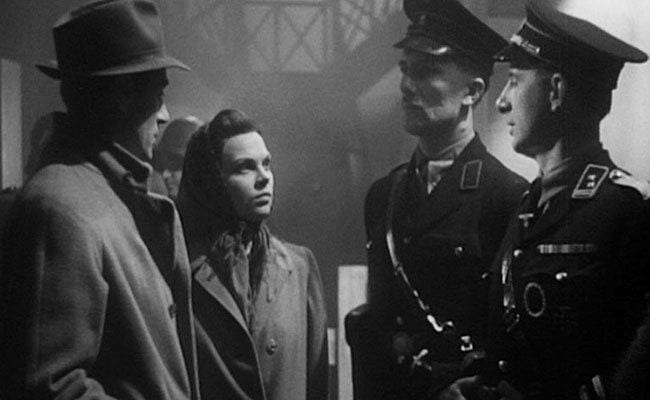
While America, and therefore Hollywood, didn’t enter the hostilities of WWII until December 1941, Britain had already been fighting in real life and in cinemas for a couple of years. Two of its most popular propaganda films are now available on Blu-ray.
Dashing matinee idol Leslie Howard, best known from Gone with the Wind (1939), was one of England’s biggest stars of the ’30s and became possibly the country’s most important film personality involved in the war effort. Books have been written about his real or speculated involvement in various projects, and the speculation extends to the circumstances of his death when Germans shot down his passenger plane in 1943. What’s a matter of record are his propaganda films, including the popular Pimpernel Smith, which he produced and directed as a vehicle for himself.
It’s loosely inspired by Baroness Orczy’s adventure hero of the Scarlet Pimpernel, whom Howard had played in a hit 1934 film. Instead of an aristocratic fop who masquerades as a swashbuckler to rescue victims of the French Revolution, however, the updated Pimpernel is an apparently meek and absent-minded archaeologist, Professor Horatio Smith (Howard), who secretly snatches various bigwigs from the clutches of Nazis.
In other words, it’s (literally) escapist entertainment in a light, non-credible key. The one elaborate escape it documents is the kind of unbelievable ruse you’d expect in a comedy like Ernst Lubitsch’s To Be or Not to Be (1942), and other adventures are referred to offscreen vaguely. One scene gives us the striking image of a scarecrow that begins bleeding when a German guard shoots it while it’s “watching” prisoners in a work camp. That stylish idea substitutes for any practical details of how the escape works, which would tax our credulity too much.
Smith begins as a disdainful bachelor who chases his female students away while a brash American lad diagnoses the prof’s “sex starvation”. By film’s end, the man who claims to love only a statue of Aphrodite has fallen for a brittle, determined heroine (Mary Morris) who’s trying to rescue her father. A portly, supercilious German general (Francis Sullivan) plays cat and mouse with them. Other figures in the large cast, like the half dozen students who support Smith, are bland and interchangeable. One of these is David Tomlinson, later of Robert Stevenson’s Mary Poppins (1964), and look fast for uncredited Michael Rennie as a camp guard.
Pimpernel Smith is handsomely designed and well-directed. As a British production aimed at adults, it gets away with touches that would have been out of order in Hollywood, like the profusion of nippled breasts on statues and paintings. The problem, aside from its wilful lack of credibility, is the pace. At two hours, it’s stretched in too leisurely a manner, thanks to its goal of providing Howard with a showcase. He’s at his best, as both actor and director, when disguised as a puff-cheeked blusterer in one sequence featuring lots of lateral camera moves at Gestapo headquarters.

Hugh Burden as John Glyn Haggard in One of Our Aircraft Is Missing (1942)
That same year, Howard played a role in Michael Powell and Emeric Pressburger’s The 49th Parallel, an above-average work of propaganda that featured unusual attention to character as it followed stranded German U-boat sailors making their way across Canada. Powell and Pressburger inverted the pattern in their follow-up the next year, One of Our Aircraft is Missing.
In this film, the six members of a British Royal Air Force mission bail out over the German-occupied Netherlands and find themselves smuggled across the country by an array of Dutch citizenry. The first half hour is a semi-documentary fascinated by the details of what it’s like to be crammed into a Wellington bomber. On the ground, the crew is mostly handled by strong women (Pamela Brown, Googie Withers) with assistance from a Catholic priest (Peter Ustinov). All the Dutch are proud patriots with straight backs except for one token sniveling, collaborating, rat-faced quisling (Robert Helpmann).
Besides the fatherly and aristocratic eldest airman (Godfrey Tearle), the Brits are as bland and interchangeable as the Pimpernel’s boys’ own gang of jolly students. They’re played by Hugh Burden, Eric Portman, Hugh Williams, Emrys Jones and Bernard Miles. Powell throws in his little eye-catching playful tricks when he can, with visual jokes abetted by editor David Lean and photographer Ronald Neame. The exteriors really feel as big as all outdoors, while the interiors are lovingly designed by David Rawnsley, especially the church and Dutch houses.
One of the most striking aesthetic qualities is the complete absence of background music — no soaring triumphs, no tugging at hearstrings, no patriotic rouses, no excited goosing during the aerial sequence with its eerie flak bursts and exploding engine. Natural ambient sound, carefully created, is the keynote throughout. Surely this accounts for the subdued sense of gravity, no pun intended for a film about falling to earth.
This quiet background for patriotic speeches and stiff upper lips might dampen some of the traditional excitement that another production would milk out of the enterprise. After all, the previous Powell / Pressburger war picture was scored by Ralph Vaughan Williams, so it’s intriguing that they chose an opposite direction so radically different from all other films of the era. American distributors might have felt the drag too much, as they cut about 20 minutes — having done the same for The 49th Parallel. The truncating must have worked, for both films were popular in the US and received Oscar nods.
These no-frills Blu-rays don’t offer restorations, and the Powell / Pressburger movie shows notable wear throughout. Still, both films can’t help looking sharply chiaroscuro in that rich ’40s-era way, inherited from German Expressionism (the irony!) on its way to developing the techniques of noir.

